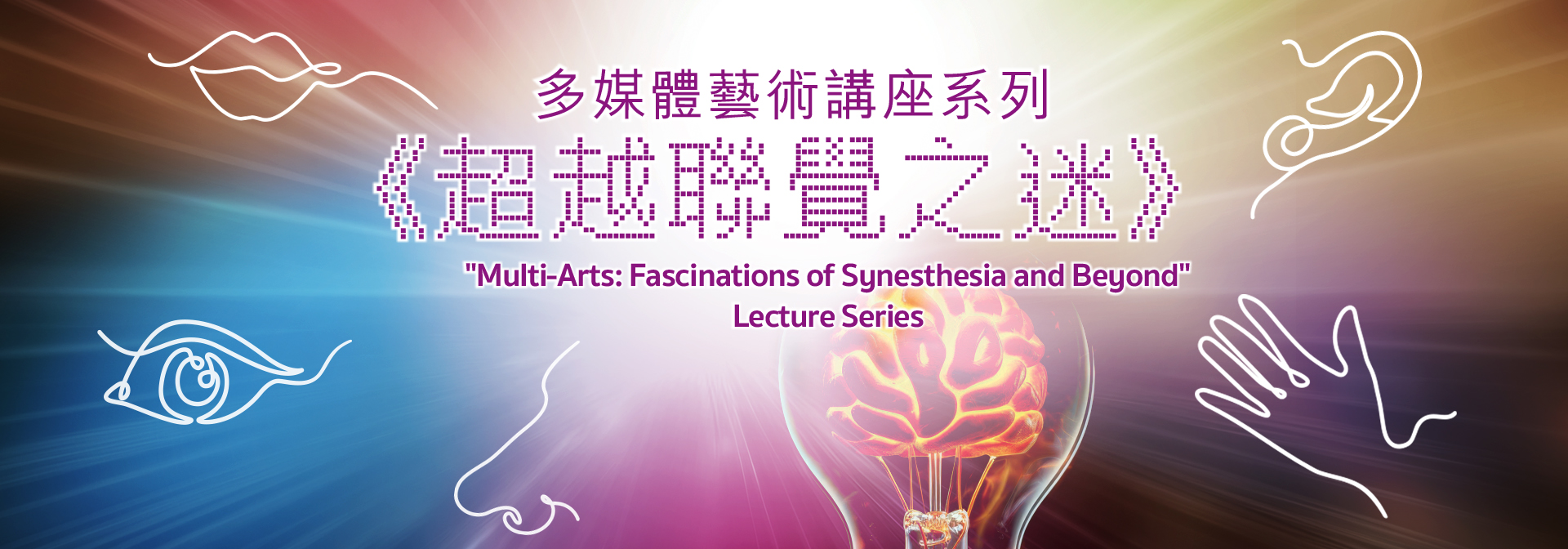
"Multi-Arts: Fascinations of Synesthesia and Beyond" Lecture Series
How can an image touch the eye? Can we hear a visual image? Can a sound be visualised? Can a word be tasted? Can we smell a colour? Synesthesia leads us to ask if a single art form can suffice and if the distinctions between five senses can be broken. Does it lead to madness? Or, can it improve our sensitivity to living? This series of five lectures will explore the possibility of how multi arts can respond to synesthesia.
In Cantonese
26 Feb (Mon)
Lecture 1: Literature, Music, Visual Art, Materiality and Food
To explore how multi-sensual elements can be heard, touched, smelled and tasted in words in order to examine the importance of multi-sensual ability in appreciating literature, art and film such as Scent of a Woman by Martin Brest, Mrs Dalloway by Virginia Woolf, Tea-Coffee by Leung Ping Kwan and Fantasia by Walt Disney.
4 Mar (Mon)
Lecture 2: Still and Moving Pictures and Beyond
To discuss how we see film in literature and painting through works such as Kiss of the Spider Woman by Manuel Puig, A Girl with a Pearl Earring and View of Delft by Vermeer and Angelus Novus by Paul Klee.
11 Mar (Mon)
Lecture 3: Opera, Play and Film
Beginning with a study of the influence of Bizet's opera Carmen on Nietzsche, to explore how can a theatrical-like performance in the filmic version of Carmen directed by Francisco Rosi ‘move’ the filmic content to the audience.
18 Mar (Mon)
Lecture 4: Gallery, Concert Hall, Theatre, Cinema, Home, Social Media and City
The Painter of Modern Life by Charles Baudelaire, The Work of Art in the Age of Mechanical Reproduction by Walter Benjamin, The Poetics of Space by Gaston Bachelard and The sun sets by Xiangcheng Shu cited to explore the multi-sensual experience of art appreciation in difference venues.
25 Mar (Mon)
Lecture 5: On Rhythm: Dancing, Rapping, Kung Fu and Philosophy
To discuss how the five senses have changed the way we appreciate and visualise works of dance, rap, kung fu and philosophy. Roland Barthes says there is no objective criterion of "readable" or "unreadable", the problem is that one hasn’t found the correct rhythm for reading them. Reading an art work requires less the reading ability than the synesthetic one to keep pace with the artistic rhythm.
More reference texts will be brought forward in the lectures.
The speaker reserves the right to change the programme content.
Each lecture will run for about 2 hours.
19:30
19:30
19:30
19:30
19:30
19:30
19:30
19:30
19:30
